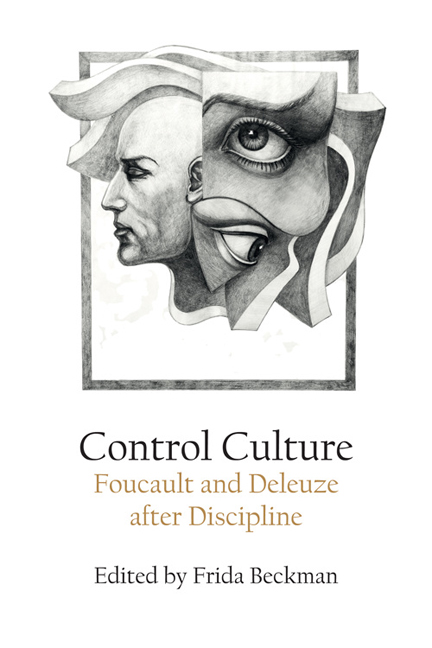Book contents
- Frontmatter
- Contents
- Acknowledgements
- Notes on Contributors
- Introduction. Control of What?
- 1 Notes from an Investigation of ‘Control Society’
- 2 Post-Mortem on Race and Control
- 3 Periodising (with) Control
- 4 Subjects of Sovereign Control and the Art of Critique in the Early Modern Period
- 5 Posthumanism, Social Complexity and the Political: A Genealogy for Foucault’s The Birth of Biopolitics
- 6 ‘That Path is for Your Steps Alone’: Popular Music, Neoliberalism and Biopolitics
- 7 Cinema in the Age of Control
- 8 Towards a ‘Minor’ Fascism: Panoptic Control and Resistant Multiplicity in TV’s Spooks
- 9 Species States: Animal Control in Phil Klay’s ‘Redeployment’
- 10 Control and a Minor Literature
- 11 Philosophy and Control
- Index
4 - Subjects of Sovereign Control and the Art of Critique in the Early Modern Period
Published online by Cambridge University Press: 05 May 2021
- Frontmatter
- Contents
- Acknowledgements
- Notes on Contributors
- Introduction. Control of What?
- 1 Notes from an Investigation of ‘Control Society’
- 2 Post-Mortem on Race and Control
- 3 Periodising (with) Control
- 4 Subjects of Sovereign Control and the Art of Critique in the Early Modern Period
- 5 Posthumanism, Social Complexity and the Political: A Genealogy for Foucault’s The Birth of Biopolitics
- 6 ‘That Path is for Your Steps Alone’: Popular Music, Neoliberalism and Biopolitics
- 7 Cinema in the Age of Control
- 8 Towards a ‘Minor’ Fascism: Panoptic Control and Resistant Multiplicity in TV’s Spooks
- 9 Species States: Animal Control in Phil Klay’s ‘Redeployment’
- 10 Control and a Minor Literature
- 11 Philosophy and Control
- Index
Summary
Early modern France is usually described as a society of sovereignty. Yet, its centralised administration as well as state-controlled art and literature during the seventeenth century point to a transition not only towards disciplinary societies to come – it also shares similarities with what Deleuze defines as our contemporary control societies (Deleuze 1995: 177–82). To be sure, in absolutist France the despotic power of Louis XIV – his right to dispose over his subjects’ life and death – diminished during the end of the century and gave way to more disciplinary forms of power by ‘an explosion of numerous and diverse techniques for achieving the subjugation of bodies and the control of populations’ (Foucault 1998: 140). Nonetheless, around the turn of the seventeenth to eighteenth centuries there existed also a kind of social formation that Norbert Elias in a classic study from 1969 described as the court society, characterised by imposed self-restraint due to the development of an increasingly differentiated and interconnected web of power relations in the early modern state (Elias 2006: 4–5). In this chapter, I want to show that former societies of sovereignty have more in common with contemporary control societies than we usually think. The idea that the early modern court society already functions as a form of control society affirms in a sense Deleuze's suggestion that it ‘may be that older means of control, borrowed from the old sovereign societies, will come back onto play’ (Deleuze 1995: 182). Or, more precisely, I want to highlight the parallels between early modern sovereign societies and contemporary neoliberal societies regarding the ambiguity of control as both enslaving and liberating, and how the ‘older means of control’ functioned both ways – as mechanisms of subjugation and as potentials for a resistance – an ambiguity that has gained new actuality today.
The motivation for this juxtaposition is that the ubiquitous character of control mechanisms in court society – where there were also subtler ways of modulating subjectivity than sovereign subjugation or disciplining as such – can be associated with a flexibility that forms the contemporary subject submitted to the ideology and function of global capitalism. I also argue that the subjective strategies of obedience or resistance developed within the French regime of absolute monarchy point to problems for every elaboration of a critical practice in relation to power, in the early modern period as well as in our contemporary society of control.
- Type
- Chapter
- Information
- Control CultureFoucault and Deleuze after Discipline, pp. 63 - 81Publisher: Edinburgh University PressPrint publication year: 2018

